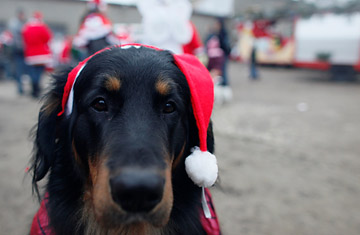
A dog dressed in a Santa Claus costume
Any dog owner will tell you that canines are compassionate and can sense human emotions. But a new study suggests that dogs' emotions are closer to ours than once thought. According to a study published Dec. 10 in the American journal Proceedings of the National Academy of Sciences, along with the most primal emotions — anger, fear — dogs also feel a simple form of envy.
The study is the first to demonstrate that animals other than primates experience envy, which has long been considered an emotion that requires self-consciousness. "It gets very exciting if you can find a bit more primitive behavior in another species that's not a primate — maybe [that behavior] is not uniquely human," says Friederike Range, principle author of the study. (See pictures of presidential First Dogs.)
To reveal Fido's green-eyed monster, Range and three other scientists at the University of Vienna put together pairs of domestic dogs, each accompanied by an experimenter. Both dogs in each pair were given commands to place their paws in the experimenter's hands, and when they obeyed, they were given a reward — a piece of bread or sausage. But when one dog wasn't given a reward for obeying, and the other dog in the room was, the unrewarded dog would refuse to respond to the repeated commands. The scientists measured the dogs' responses by how many times they had to prompt the unrewarded dog before it obeyed.
The dogs' reactions to the unfair distribution of rewards is called "inequity aversion" — when an animal acts to stop perceived inequalities within its social group — and it's a defining characteristic of social, or cooperative, species. "They wanted the same reward for the same work," says Paul Morris, a lecturer in psychology at the University of Portsmouth who specializes in animal behavior. Morris is quick to explain that the study's results aren't anthropomorphic: "I'm not saying that dog jealousy is precisely like human jealousy." Instead, he says, the dogs likely experienced a primitive form of envy.
Emotions are a result of evolution: they cause organisms to act in ways that enable their survival. Jealousy, for instance, improves an animal's chance of survival by motivating it to protect its mates and secure alliances for safety. Historically, science has separated emotions into two categories: primary and secondary. Primary emotions such as fear and anger are considered universal, while it's thought that secondary emotions such as envy, jealousy and guilt require more complex cognitive processes. Of envy, Range says, "It's not a very simple emotion. You actually have to pay attention to what the other [animal] is getting."
Most dog lovers don't need a study to tell them that their pets are capable of feeling more complex emotions. "For dog owners, they are probably thinking, 'Of course,'" says Range. Maurice Melzak, editor of Petstreet, a social networking site for pet enthusiasts, says his dog, an Airedale terrier named Roxy, clearly has a sense of fair play and justice. She also demonstrates guilt. Once, when Melzak found empty food wrappers on the kitchen counter and asked who did it, "immediately Roxy's tail went between her legs, she had this really sheepish expression on her face, and she went to skulk on the stairs. She knew she wasn't meant to do that." Melzak says Roxy also behaves jealously when he pays attention to other dogs. (See pictures from the Crufts Dog Show.)
But while the study may be stating the obvious to dog owners, Morris at the University of Portsmouth says this particular breakthrough lends credibility to research on animal cognition. "The argument has always been that the reason why chimps can do really sophisticated stuff is because they're almost like people," he says. But "when you have other organisms doing these sophisticated things, it challenges our models."
The study also lends weight to the concerns of animal rights and welfare activists. "The more we understand about what animals actually experience, or what they feel, the better we can judge what we do to them," Range says. So it's good news for animal lovers that Man's Best Friend is the jealous type.
